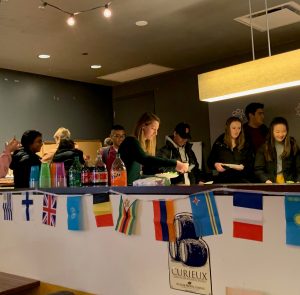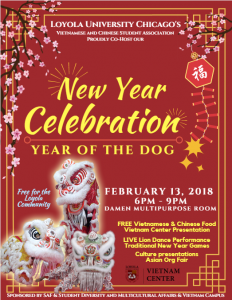Study Abroad Has Every Loyola Student Talking
You don’t realize how popular studying abroad at Loyola is until you become a student on campus. It seems like everyone’s mind is considering whether they want to study abroad. From taking the Loyola shuttle to the downtown campus, to waiting in line to pay for your curly fries in Damen, it is fairly possible you will hear the words “study abroad” once in a while.
This is due to the popularity of studying abroad at Loyola. 1 out of 3 students choose to go abroad either for a semester, a month in the summer, of two weeks during the January holiday break. The opportunities Loyola creates for its students to study in a different country attracts their attention. This leaves some students feeling like their college career wouldn’t be complete if they didn’t have an abroad experience.
This was evident in my friend group freshman year. I remember the night: second semester freshman year at De Nobili Residence Hall. I entered my friend’s dorm to see her two roommates on their laptops looking at places to study abroad and talking about when they would go together. I was astounded by this site, considering this topic hadn’t hit my mind. All I was thinking about were passing my classes and making friends.
My friend then asked me, “Where do you want to study abroad?”
I had no clue if I wanted to study abroad or even if that was an option. It seemed like a lot of discerning and planning. I left feeling confused as I returned to my dorm that night.
Questions I asked myself were: Did I want to study abroad? Is it a lot of money? How do I know which country is the right one for me? Will I be able to graduate on time?
Disclaimer: studying abroad isn’t for everyone. Some of my friends chose not to study abroad and their four years at Loyola have been memorable. AND there is no pressure to know freshman year where exactly you want to go and when. It will take time and seeking out answers to see if this is the perfect fit for you. I had a lot of time to decide if I wanted to go or not, and there was no pressure to know right away.
Rolling into the first semester of Sophomore year, I attended a Study Abroad Fair in Damen that was sponsored by the Office of International Programs. At one of the tables I met a student representative who had studied abroad in Thailand for a semester. We had a great conversation and he recommended for me to schedule an appointment at their office so we could look into the idea for me to possibly go abroad more in depth.
At my appointment in their office, located on the second floor of the Sullivan center, I met with the same student. This was a pat on the back for me because I was pushing myself to get out of my comfort zone and seek out an opportunity that interested me. We looked through the Study Abroad website together which lays out all the various programs and locations.
Another student worker at the desk behind us overheard our conversation. His words are ones I will never forget: “I am so jealous of you”.
Jealous of me? How?
This other student worker shared with me his experience abroad and how he would go back in a heartbeat. After hearing both their testimonies of their experiences abroad like the culture, food and people, I was excited about what this opportunity had in store for me.
Once I have chosen my program, they directed me to follow up with my academic advisor to verify the courses and the financial aid office to consider all cost factors.
I was sold. I wanted to study abroad. And after learning that it was a possibility for me, it made yearning to go even greater.
After a few months of discerning and meeting with different offices, I had decided I would be attending school in Barcelona, Spain for a semester.
 My first week in Barcelona, Spain in front of the Barcelona Cathedral.
My first week in Barcelona, Spain in front of the Barcelona Cathedral.
To be continued…









.jpg)




